The following is a transcript of this video.
-
“The [totalitarian] state is a tiger seeking to devour the people, and they must either kill or cripple it. Their own safety depends upon it.”
—Benjamin Tucker, Individual Liberty
One of the overriding themes of history is the battle between servitude and freedom – between power being centralized in small groups who wield it over the many, versus power being dispersed in a more decentralized manner where the individual is free to control his or her own life.
-
“Freedom is the right to live as we wish. Nothing else.”
—Epictetus
Recently, this battle has been one-sided as statist governments across the globe have gained immense powers at the cost of individual liberties. Freedoms we took for granted, such as the ability to control our body, business, property, or medical treatments, or merely to speak our mind, are under serious threat. An important question arises: Why do so few people seem to care about freedom these days? Why, in other words, are we permitting the emergence of a totalitarian form of rule and in the process allowing bureaucrats and politicians to control the most precious of all things, our one chance at life?
Some will claim that the answer is simple: When a crisis strikes, the common man or woman is incapable of acting in his or her best interest and so we need an all-controlling government to keep us safe. But such an answer ignores a crucial lesson of history: the closer a state approaches total control, the more the human race suffers. The Soviet Union, China, Germany, Italy, Romania, Cuba, Cambodia, North Korea, all these countries flirted with total state control and all these countries experienced social destruction as a result. What is more, the governments in all these countries used crises, real or manufactured, to justify the initiation and the continuation, of this suffocating form of political rule.
Totalitarianism is not a solution to any problem, totalitarianism is a social disease of the worst kind. A better explanation, than the false and ignorant claim of its necessity, is needed to account for the modern day acceptance of this form of rule. We will suggest that three main factors can account for this phenomena: firstly, the human tendency to accept the status quo, secondly, a school system that is effectively indoctrinating people to worship the state, and thirdly a population so overwhelmed by fear that most people are failing to think clearly.
That people can adopt beliefs and strongly adhere to them without being presented evidence as to why they should, or whether such beliefs are true, is a common phenomenon. Among the things we are most likely to accept on faith are the dominant practices, customs and institutions of the society into which we are born. Humans, in other words, are prone to what is called a status quo bias. This bias, however, is beneficial for the functioning of a society. The world is too complex, many social institutions too complicated, and our minds are too limited and so some things we have to accept at face value until proven otherwise. For as the mathematician and philosopher Alfred North Whitehead wrote:
-
“…civilization advances by extending the number of important operations we can perform without thinking about them.”
—Alfred North Whitehead, An Introduction to Mathematics
The status quo bias can help explain why so many people passively accept the modern form of statist rule even as it reaches pathological proportions. Born into a world dominated by state governments, this is all most people know and so it seems almost natural to be ruled in this manner. But not all the things we unquestioningly accept about our society are of a beneficial nature. Given the impossibility of a utopia, all societies, past and present, have practices, customs, or institutions which hinder social flourishing. And herein lies the problem with the status quo bias. Most people fail to distinguish between those things which promote social well-being and those which do not. From human sacrifice, to cannibalism, to the belief that an emperor was the embodiment of a divine figure or that skin color or caste determined one’s worth as an individual – there is no shortage of cultural practices and social institutions which at times enjoyed mass acceptance but which to outsiders, or with the passage of time, appear irrational, absurd, or merely in place to maintain the power of certain people.
-
“Due to a general status quo bias, once a practice or institution becomes established in some society, that practice is likely to be viewed by the members of that society, almost automatically, as normal, right, and good.”
—Michael Huemer, Problem of Political Authority
But while the status quote bias creates a tendency for people to automatically accept the practices and institutions of their society, the status quo does not stay status quo forever. Change does occur, some institutions are abandoned while others remain entrenched for centuries. The modern state began its rise to dominance in the mid 17th century, and while other forms of political organization, such as monarchies, existed for much longer, a question arises as to what is allowing the statist ideology to remain status quo even as it reaches the pathological and destructive proportions of total control?
And this leads us to the second factor contributing to the acceptance of totalitarianism: the modern state has been very good at winning the battle of ideas and in the process indoctrinating the masses to view an increasingly all-controlling state as necessary and justified. While many means have been used to accomplish this feat, such as rampant propaganda from the media and entertainment industry, control of the education system is perhaps the state’s greatest tool of indoctrination. The most formative years of our lives, when we are at our most curious and receptive, are spent in an institution controlled by the state and if one defines education as teaching one how to think and indoctrination as teaching one what to think, it is clear that indoctrination is what takes place in public schools from the elementary to post-secondary level. For no matter if we grew in Nazi Germany, Stalinist Russia, modern day China or North Korea, or if we live in the West, we were taught that the form of government under which we live is the greatest form of government and that without it we would all be poor and destitute, disease would run rampant and chaos would ensue. Or as Murray Rothbard wrote in Education: Free and Compulsory:
-
“…every politically controlled educational system will inculcate the doctrine of state supremacy sooner or later, whether as the divine right of kings, or the 'will of the people' in 'democracy.' Once that doctrine has been accepted, it becomes an almost superhuman task to break the stranglehold of the political power over the life of the citizen. It has had his body, property, and mind in its clutches from infancy. An octopus would sooner release its prey.”
—Murray Rothbard, Education: Free and Compulsory
One of the most effective means of indoctrinating the youth to accept the doctrine of state supremacy is to ensure that their schooling fails to distinguish between the ideal of modern government and the reality of how it operates. For in the West we learn of checks and balances, the distribution of power, the ability of everyone to have an equal voice through the mechanism of the democratic vote, how we are all equal under the law, how our leaders are benevolent, and how the governments acts in the interests of the people. But we are not taught of the massive flaws that exist with modern statist governments: of the rampant corruption, the psychopathology of many of those in power, the inefficiency and waste, the inequality between rulers and ruled, and the economic destruction that is a by-product of most government regulation. Having the idealized version of modern government imprinted on our minds, most people go through life believing that this is an actual fact of how the modern state operates, or as Michael Parenti wrote:
-
“The enormous gap between what US leaders do in the world and what Americans think their leaders are doing is one of the great propaganda accomplishments of the dominant political mythology.”
—Michael Parenti, Dirty Truths
In addition to the status quo bias and rampant indoctrination, the sowing of fear also promotes acceptance of totalitarian rule. For as John Adams, one of the founding fathers of America, recognized “Fear is the foundation of most governments”. If you can keep a population in fear, you greatly diminish the chance that people will come to question whether total state control is going to produce anything but economic destruction and suffering on a mass scale, for fear interferes with one’s ability to think or as Edmund Burke put it:
-
“No passion so effectually robs the mind of all its powers of acting and reasoning as fear.”
—Edmund Burke, The Works of the Right Honorable Edmund Burke
Modern states merely need to latch on to some form of threat, foreign or domestic, real or imagined, and with the help of the mass media and the algorithms of censorship of social media, they can convince the population that the threat is of apocalyptic proportions and that only those in government can defeat it, and as Connor Boyack explains in his book Feardom:
-
“[Fear] incapacitates its victim, encouraging him to fecklessly submit to others’ proposed solutions. These supposed solutions are often offered by conniving conspirators looking to capitalize on the individual’s defenselessness, much like a predator inducing a temporary state of paralysis in its prey. Rather than acting, the fearful person is acted upon.”
—Connor Boyack, Feardom
If it is fear, indoctrination and the status quo bias that are contributing to the acceptance of totalitarian rule, what can those of us who still value freedom do to turn the trajectory away from this pathological form of rule? We can use whatever means we have at our disposal to help win the information war and to reveal the politicians and bureaucrats for what they really are – power hungry, often psychopathic or narcissistic individuals, who are leading modern day societies to ruin. We need to wake more people up to a few simple facts: those who are trying to control us are not our saviors, and totalitarianism is still totalitarianism no matter what excuse is used to justify it.
-
“Historically, freedom is a rare and a fragile thing. It has emerged out of the stalemates of would be oppressors… everywhere there are those prepared to scrap it for other things that shine more brightly for the moment… Freedom is not simply the right of intellectuals to circulate their merchandise. It is, above all, the right of ordinary people to find elbow room for themselves and a refuge from the rampaging presumptions of their ‘betters’”.
—Thomas Sowell, Knowledge and Decisions
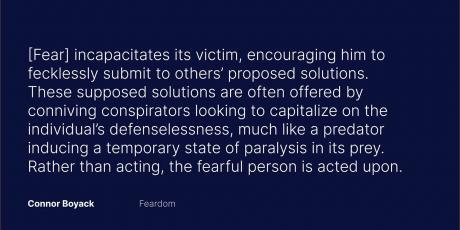
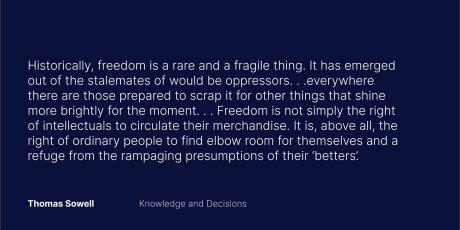
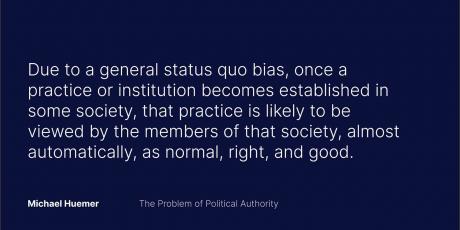
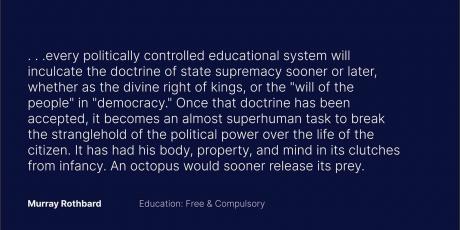




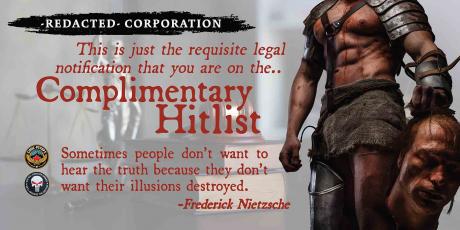

Comments